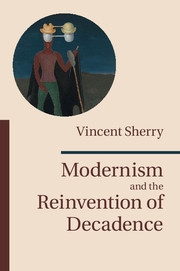Book contents
- Frontmatter
- Dedication
- Contents
- Acknowledgments
- Introduction The Codes of Decadence: Modernism and Its Discontents
- Chapter I The Time of Decadence
- Inter-chapter The Cultivation of Decay and the Prerogatives of Modernism
- Chapter II The Demonstrable Decadence of Modernist Novels
- Inter-chapter Imagism
- Chapter III Ezra Pound: 1906–1920
- Inter-Chapter Reforming Decadence: Late Romanticism, Modernism, and the Politics of Literary History
- Chapter IV T. S. Eliot: 1910–1922
- Afterword Barnes and Beckett, Petropi of the Twilight
- Notes
- Index
Chapter II - The Demonstrable Decadence of Modernist Novels
Published online by Cambridge University Press: 05 October 2014
- Frontmatter
- Dedication
- Contents
- Acknowledgments
- Introduction The Codes of Decadence: Modernism and Its Discontents
- Chapter I The Time of Decadence
- Inter-chapter The Cultivation of Decay and the Prerogatives of Modernism
- Chapter II The Demonstrable Decadence of Modernist Novels
- Inter-chapter Imagism
- Chapter III Ezra Pound: 1906–1920
- Inter-Chapter Reforming Decadence: Late Romanticism, Modernism, and the Politics of Literary History
- Chapter IV T. S. Eliot: 1910–1922
- Afterword Barnes and Beckett, Petropi of the Twilight
- Notes
- Index
Summary
This chapter presents a range of writing that comes under the general heading of the novel of the historical present. This fiction works overtly to the purpose of representing its current circumstance, which is defined imaginatively as well as chronologically by the (lengthening) turn of the century. For the historical content of the novel as genre, it claims the temporal imaginary of late days as the present condition of England. This is the establishing circumstance of the “decadence” this literature represents as a matter of imagined contemporary fact.
These books are written by novelists who are not identifiable in any ready-made way, however, with the traditions of literary decadence, either individually or, certainly, as a group: Henry James, Joseph Conrad and G. K. Chesterton, D. H. Lawrence, Frederic Manning and Rebecca West. Not as the tag attached to the more infamous of the Nineties writers, the “decadence” in these books works in a more complex and important way. It provides a record of end feeling as an established, if uneasily assimilated, understanding, one that has already generated a set of literary conventions and so needs to be taken as the record of an essential stage in literary history. These novels complement the historical content of late or last days with a broad and resourceful implementation of those literary techniques we established in “Afterward: A Poetics,” which, all in all, demonstrate the historical condition of decadence in a sort of poetics in prose.
- Type
- Chapter
- Information
- Modernism and the Reinvention of Decadence , pp. 110 - 154Publisher: Cambridge University PressPrint publication year: 2014



